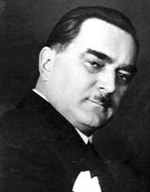Yugoslavian parliamentary election, 1938
|
|
|||||||||||||||||||||||||
|---|---|---|---|---|---|---|---|---|---|---|---|---|---|---|---|---|---|---|---|---|---|---|---|---|---|
|
|||||||||||||||||||||||||
|
All 373 seats to the Narodna skupština |
|||||||||||||||||||||||||
|
|||||||||||||||||||||||||
|
|||||||||||||||||||||||||
Parliamentary elections were held in Yugoslavia on 1 December 1938. The result was a victory for the governing Yugoslav Radical Union, which won 306 of the 373 seats in Parliament.
The Yugoslav Radical Union was an alliance of the People's Radical Party led by Milan Stojadinović, the Yugoslav National Party led by Bogoljub Jevtić, the Yugoslav Muslim Organization led by Mehmed Spaho and the Slovene People's Party led by Anton Korošec.
The United Opposition consisted of:
Although the United Opposition, led de facto by Maček, had attracted 44.9 per cent of the vote, due to the electoral rules by which the government parties received 40 per cent of the seats in the National Assembly before votes were counted, the opposition vote only translated into 67 seats out of a total of 373.
Following the election, there was a faction led by the commander of the Royal Yugoslav Air Force (VVKJ), General Dušan Simović, that contemplated a pro-Serb coup. Simović had been involved in similar plotting earlier in the year.
...
Wikipedia


